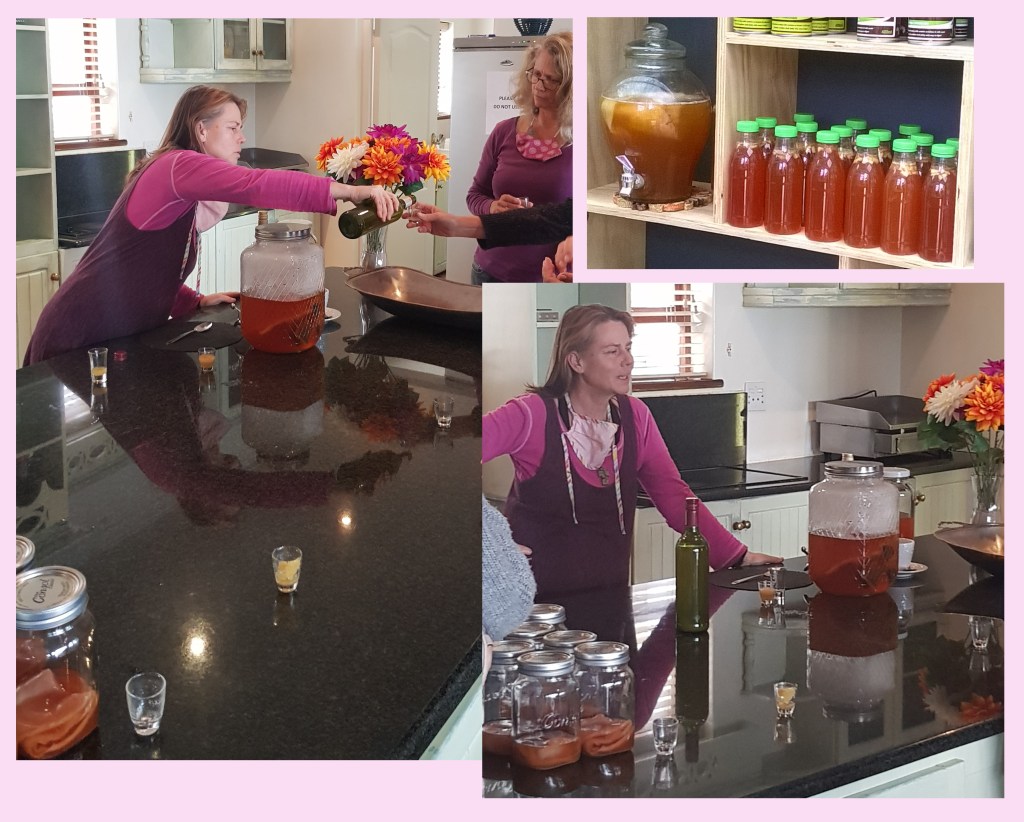Scoby (Symbiotic Culture of Bacteria and Yeast)

How to make
Instructions for making 3 litres:
1.Boil filtered water. Add to a cup of sugar and 4 teabags in a 3 litre glass jar.
2.Mix until sugar is dissolved and let steep.
3.Once cooled, remove teabags and add scoby.
4.If making from scratch add a tablespoon of vinegar. Otherwise add a cup of previous kombucha to new batch.
Seal with a paper towel/cloth and elastic. Your kombucha needs 10-14 days to ferment completely.
Only use plastic or glass utensils which have been washed in vinegar. Wash hands with vinegar too if handling scoby, never soap. Don’t use aluminum and steel items.
Once your kombucha is ready, remove the scoby to make a new batch, repeat above instructions to make a new batch.
Give it some fizz!
Use your fermented Kombucha to make a lovely fizzy carbonated drink. You can add flavours like ginger, cinnamon, coconut, lemons, fruit, herbs to your kombucha for taste but only if its organic otherwise it will kill the healthy bacteria.
Place in sealed jar for up to 3 days. This will create much more fermentation and carbonation so be careful when opening the lid.
Kombucha is a living product and will continue to ferment. If left to ferment it makes a lovely vinegar for dressings. If left to ferment over a longer period it becomes a lovely astringent cleaning product, so you never waste any.
Keep in fridge to slow down fermentation process. Never keep your scoby’s in the fridge.
History
Kombucha originated in Northeast China (historically referred to as Manchuria) around 220 B.C. and was initially prized for its healing properties. Its name is reportedly derived from Dr. Kombu, a Korean physician who brought the fermented tea to Japan as a curative for Emperor Inkyo.
In 1857 the French chemist Louis Pasteur first described the lactic acid as the product of a microbial fermentation. During this time, he worked at the university of Lille, where a local distillery asked him for advice concerning some fermentation problems.
Per chance and with the badly equipped laboratory he had at that time, he could discover that in this distillery, two fermentations were taking place, a lactic acid one and an alcoholic one, both induced by some microorganisms.
He was for example the first to describe fermentation as a “form of life without air.
According to the Journal of Agricultural and Food Chemistry, Kombucha has effective anti-microbial properties against several harmful micro-organisms including salmonella, staphylococcus, H. pylori, E. coli etc. Kombucha tea has a nice refreshing taste similar to apple cider and has been praised for supporting natural balance and vitality of the body for centuries.
Benefits
Lactic acid, another key element found in Kombucha, acts as a probiotic, helping to maintain healthy microflora that is essential for a strong immune system. It is recommended after the use of antibiotics.
It is believed to help fight off harmful bacteria and pathogens by regulating the level of acidity in the digestive tract. Kombucha tea also contains live enzymes and is rich in antioxidants. Over the centuries Kombucha has been used as a folk remedy to increase vitality, improve digestion, relieve constipation, detoxify the liver, lose weight, reverse the aging process, thin the blood, control appetite, prevent and treat cancer, arthritis, asthma, acne, high blood pressure, bronchitis, candida, high cholesterol, chronic fatigue, depression, colds and flu, diarrhea, gout, kidney problems (including stones), psoriasis, rheumatism, menopause, hair loss, graying, and so much more!
You can buy Kombucha from Natural Healing in Knysna and many other outlets. You can drink from 150ml to 250ml a day to feel the benefits.
Kombucha is not a replacement for medication. Please consult your professional health care provider before using Kombucha.
Some additional information
Benefits of fermented foods
There are countless health benefits to probiotics, (pro- “for” + biotics “life”). These remarkable microorganisms, which outnumber our bodily cells 10 to 1 contribute over 95% of our body’s total genetic information.
They are also:
• are rich in enzymes
• break down highly toxic chemicals which your body is either incapable, or only partially capable, of defending itself from
• creates a protective lining in the intestines and shields against pathogenic factors like salmonella and E. coli
• lead to an increase in antibodies and a stronger immune system
• regulate appetite and reduce sugar cravings
• improve digestion
• restore the proper balance of bacteria in the gut
• increase vitamin content
• assist in the absorption nutrients
However, what many people do not realize is that it is not appropriate to consume fermented foods while there is a gut infestation of molds, parasites, bacteria and viruses as you create havoc. (symptoms like boating, nausea, diarrhea etc) as it could make symptoms worse.
I recommend you first do a pathogen cleanse, maybe even a heavy metal detox and live flush and then make these powerful probiotics part of your lifestyle.
Happy Brewing!
